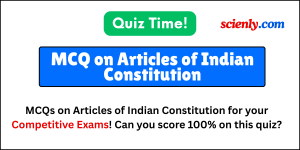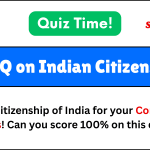Top 20 Citizenship MCQ Quiz for Competitive Exams
Welcome to this ultimate Indian Citizenship MCQ quiz. In this quiz, we’ve compiled the top 20 multiple-choice questions based on the citizenship of India. These MCQ quizzes will test your knowledge and boost your preparation for UPSC, SSC, RRB, and State PCS exams. You’ll get a scorecard at the end of the quiz to check your performance.
So, are you ready to score 20/20? Let’s find out how well you really know the citizenship of India. Let’s begin with question number 1.👇
1. Under which Part of the Indian Constitution is details of Citizenship discussed?
A. Part I
B. Part II
C. Part III
D. Part IV
b
Citizenship is covered under Part II of the Indian Constitution.
2. Which of the following Articles of the Indian Constitution deals with Citizenship?
A. Articles 1 to 4
B. Articles 5 to 11
C. Articles 12 to 18
D. Articles 19 to 22
b
Citizenship provisions are contained in Articles 5 to 11 under Part II of the Constitution.
3. Which Article of the Indian Constitution defines who were citizens at the commencement of the Constitution?
A. Article 5
B. Article 6
C. Article 7
D. Article 8
a
Article 5 deals with citizenship at the commencement of the Constitution (26 January 1950).
4. Which one of the following Article provides for citizenship of migrants from Pakistan?
A. Article 5
B. Article 6
C. Article 7
D. Article 8
b
Article 6 deals with persons who migrated from Pakistan to India before and after partition.
5. Which of the following has the power to regulate the right of citizenship in India?
A. Union Cabinet
B. Parliament
C. Supreme Court
D. Law Commission
b
Parliament has the power to regulate the right of citizenship in India.
6. The Citizenship Act was enacted in which year?
A. 1947
B. 1950
C. 1955
D. 1961
c
The Citizenship Act, 1955 provides detailed provisions for acquisition and termination of Indian citizenship.
7. How many ways are provided in the Citizenship Act, 1955 for acquiring citizenship of India?
A. Three
B. Four
C. Five
D. Six
c
Citizenship can be acquired by birth, descent, registration, naturalisation, and incorporation of territory.
8. Citizenship by birth is defined under which section of the Citizenship Act, 1955?
A. Section 2
B. Section 3
C. Section 4
D. Section 5
b
Section 3 deals with citizenship by birth.
9. Which country has not accepted the policy of dual citizenship?
A. India
B. Canada
C. Australia
D. USA
a
The Constitution of India provides for single citizenship for the entire country. It does not accept the policy of dual citizenship. According to Article 9 of the Indian Constitution and the Citizenship Act, 1955, if an Indian citizen voluntarily acquires citizenship of another country, they automatically lose their Indian citizenship. Countries like Canada, Australia, and the USA allow dual citizenship, but India does not.
10. Which of the following is not a method of losing citizenship?
A. Renunciation
B. Termination
C. Deprivation
D. Registration
d
Registration is a method of acquiring citizenship. The Citizenship Act, 1955 prescribes three ways of losing citizenship. They are renunciation, termination, and deprivation.
11. Which Schedule of the Constitution deals with citizenship?
A. First
B. Second
C. There is no Schedule for Citizenship.
D. Eighth
c
Citizenship is discussed only in Part II, not in any Schedule.
12. Indian Citizenship by registration may be granted to
A. Persons who are married to a citizen of India.
B. Persons of Indian origin who are ordinarily resident in India.
C. Minor children with two Indian citizen parents born overseas.
D. All of the above
d
The Citizenship Act, 1955 allows these categories to apply by registration.
13. Which of the following statements about OCI cardholders is correct?
A. They have full political rights in India.
B. They can vote but not hold public office.
C. They cannot vote, contest elections, or hold constitutional office.
D. They are Indian citizens by descent.
c
OCI (Overseas Citizen of India) cardholders are not Indian citizens. They can enjoy several economic, educational, and travel-related benefits. However, they do not have any political rights, which means they cannot vote, contest elections, or hold constitutional offices in India.
14. The Citizenship (Amendment) Act, 2019 applies to migrants from which countries?
A. Pakistan, Bangladesh, Nepal
B. Afghanistan, Bhutan, Myanmar
C. Nepal, Bhutan, Sri Lanka
D. Afghanistan, Bangladesh, Pakistan
d
The CAA 2019 excludes Muslims and includes the six listed religions such as Hindu, Sikh, Buddhist, Jain, Parsi, Christian from Afghanistan, Pakistan, and Bangladesh.
15. Which of the following Article gives citizenship rights to Indians residing outside the country?
A. Article 8
B. Article 9
C. Article 10
D. Article 11
a
Article 8 of the Indian Constitution addresses citizenship for people of Indian origin residing outside the country.
16. Which one of the following Article empowers Parliament to make laws regarding citizenship?
A. Article 9
B. Article 10
C. Article 11
D. Article 12
c
Article 11 gives Parliament the power to regulate citizenship by law.
17. Citizenship of India by naturalisation requires residence in India for how many years?
A. 5 years
B. 7 years
C. 10 years
D. 12 years
d
Normally, a person must reside in India for 12 years before applying for citizenship by naturalisation.
18. Which Article states that no person shall be a citizen of India if he voluntarily acquires citizenship of another country?
A. Article 8
B. Article 9
C. Article 10
D. Article 11
b
Article 9 of the Constitution of India states that if a person voluntarily acquires the citizenship of any foreign State, they are not deemed to be a citizen of India.
19. Consider the following statements about Indian citizenship.
- The Constitution of India provides for dual citizenship.
- Citizenship in India is based on both birth and descent.
- Parliament has the power to make laws regarding acquisition and termination of citizenship.
A. 1 and 2 only
B. 1 and 3 only
C. 3 only
D. 2 and 3 only
d
India does not allow dual citizenship (Statement 1 is incorrect).
20. Match the following modes of losing Indian citizenship with their descriptions.
| Column A (Mode) | Column B (Description) |
|---|---|
| A. Renunciation | 1. When citizenship is taken away by the Government of India for fraud or disloyalty to the Constitution of India. |
| B. Termination | 2. When a citizen voluntarily gives up Indian citizenship after acquiring the citizenship of another country. |
| C. Deprivation | 3. When a citizen voluntarily acquires citizenship of another country and gives up his Indian citizenship. |
A. A–1, B–2, C–3
B. A–3, B–2, C–1
C. A–2, B–3, C–1
D. A–1, B–3, C–2
c
Renunciation: Voluntarily giving up Indian citizenship.
Termination: Losing citizenship by acquiring foreign nationality.
Deprivation: Government withdraws citizenship for misconduct, fraud, or disloyalty.
Termination: Losing citizenship by acquiring foreign nationality.
Deprivation: Government withdraws citizenship for misconduct, fraud, or disloyalty.
Quiz Results
Total Questions: 0
Correct Answers: 0
Incorrect Answers: 0
Score: 0%







